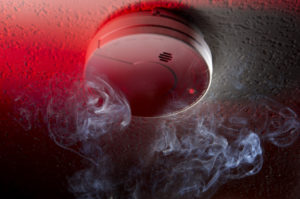Fire Safety Tips for Your Home

Smoke Alarms & Evacuation
- Smoke alarms should be installed on each level of your home; at least one in each bedroom and bath and hallways outside sleeping areas. Smoke alarms in good working order reduce the chances of dying in a fire by nearly fifty (50%) percent and are one of the most important steps in your plan for keeping your home and family safe. If you need help in determining the best type and how many you should have, contact your local Fire Department for assistance. They usually have a dedicated team member or department that will assist you or will provide a resource that can.
- The useful life of most smoke alarms is 10 years. So if your alarm is more than 10 years old, consider replacements; unless otherwise noted in the manufacturer’s literature.
- Mark your calendar and schedule a test of your smoke alarms each month. If they’re not working, change the batteries and test again. A good rule of thumb is to change the batteries in all of your alarms when you move your clocks for daylight savings time in the Spring or Fall. Do this even if alarms are wired directly into your home’s electrical system. If your electricity is out, your alarms will then revert to battery power.
- Develop a fire escape plan, educate your family and practice the plan at least twice a year. There is a wealth of helpful information available over the Internet, but if you need help in developing a plan, call your local Fire Department, chances are they will have someone who can work with you or direct you to someone who can.
- MOST IMPORTANT! If a fire occurs in your home, GET OUT, STAY OUT and CALL FOR HELP. Never, ever go back inside for anything or anyone.
Additional Resources:
American Red Cross Home Fire Safety
U.S. Fire Administration (FEMA)
Harford County Fire & EMS (Public Safety)
